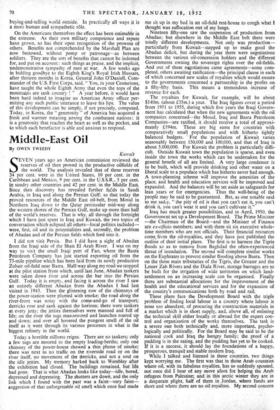Soldiers in Korea
By ROWLAND WINN ti T1 EPEND upon one thing " I was cautioned by the kindly War Correspondent. " Nobody over there," and he waved airily towards the fogbound coast of Britain, " is the least interested in Korea." We were on the open deck of a Korean trooper, standing off Liverpool, and he spoke with the sapience of one who had ',turned three months before us, having come aboard to greet old friends from the campaign. In the weeks that have followed, I have learned to endorse and, characteristically, to ignore his warning.
Many—too many—lessons were forced upon the individual in Korea. It may be that in the light of a later day a good half of them will be seen as false lessons by those who studiejl there. But nobody, having fought over that inhospitable peninsula, can have sailed away without at least the illusion of having learned something. And behind our valedictory epithets there lurked also the bashful conviction of having done something worth while. In a sense it was something that no one in history had done before. Soldiers had set off for a foreign war in the name of Decency and nothing else. Indignant, peaceable men of a dozen nations, with no other bond to bring them together, had met and fought as comrades, each under his own flag, on the field of honour, with an undivided ultimate purpose. They had fought over a malodorous, nearly unheard-of territory—for many of them as far away across the globe as a man could travel. They had fought defiantly, against numerical and strategic odds which appeared to mock their weapons and military science—but over which, in com- radeship, they had prevailed. The first purpose of their coming was achieved. The enemy had been driven back, over the unprotected border he chose to invade, and those, or some of those who came to achieve it were free to return to their own lands.
At every stage of the campaign, in a score of stubborn actions, of which the Gloucesters' great stand at the head of the Solma-ri valley was only one (and in cost of life perhaps not the most sacrificial), British units distinguished themselves wherever they were called upon to fight. At the time we in the 29th Brigade Group reached Pusan from Southampton, in mid- November of 1950, those of the hastily formed and dispatched 27th Brigade—the Argylls, Middlesex and the Australian Battalion—had already won a fame, on Korean soil, that they would live up to as long as they remained, and which was a spur to our own endeavours. The 29th Brigade reached Pyongyang, the northern capital, in time to join the great winter retreat. They were not in action against the enemy until the night of January 2nd/3rd. The brigade was placed protecting Seoul, the capital, astride what looked, and proved, to be the enemy's main line of advance, the road from Kaesong. The opening attack was carried out at night, in great strength, and • with a ferocity which drove , in part of our line; some platoon positions of the Northumberland Fusiliers and the Ulster Rifles were over-run. Counter-attacks were made in the morning (one Ulster officer capturing personally an enemy bugle which had irritated him during the night), and by early afternoon of the 3rd, the line had been restored in its entirety. By this stage of the war the besetting weakness of the Eighth U.S. Army in Korea had become plain. The American Army troops, making up overwhelmingly the largest element, had not only to be taught to fight—with the excellent weapons in their hands—but had to be given the " w,jll " to fight, a still more intimidating task at the time. That both tasks were undertaken and achieved, within a year, must be partly put to the credit of that doughty and frequently insulting soldier, General Matthew B. Ridgway, but in even greater part to the example set by the soldiers of the traditional Old World, those of Britain (with the Commonwealth), Turkey an-a the European nations—their steadiness in the field, and their impressive confidence in each other. A less compelling personality than General Ridgway could hardly have gathered into a whole the distrustful frag- ments of that Army as he found it, and re-instilled an intention to advance. It won for him the well-muzzled hostility of the existing Staff, but the adniiration and loyalty of all who had come to Korea to fight.
Under his command all units, American and non-American, found a new and unexpected confidence in the conduct of the campaign; but it was largely upon the non-American army troops that he had at first to rely. The Turks, four thousand strong, had established a reputation for truculent valour with their earliest action. In their pure " enjoyment " of battle they were unlike any other U.N. contingent, and apparently more careless of casualties (though after the shocking and immoderate losses—eight hundred officers and men—to which they were exposed at Kunuri, a certain menacing resentment was in evidence for a period). The Greek Battalion, fighting with courage and hardihood under conditions of the bitterest winter, made their name early and sustained it. To see them swinging through the streets of Suwon, chanting their war-songs on their way to the front, was an inspiring sight in the winter of 1950. The large French Volunteer Battalion, under their Colonel Montclar—who had applied for demotion from General in order to command them—suffered the highest proportionate losses of any national contingent, winning great honour with their blood. Within some hours of taking their place in the line, they had stormed an enemy-held hill three times ("Good God!" cried an American officer. " They're going in with the bayonet!"), and seized it finally against the fiercest resistance. The Dutch Battalion, given a vitally important sector of the front to hold, stood immovably against repeated attacks-11y a greatly superior force, and remained indifferent to their losses, until support could be sent; winning a Presidential Citation in. this action.
But of all such examples the most warming and exalting to our own experience was the part played by the Belgian Battalion within the British 29th Brigade Group. This small force, during the now epic Battle of the Imjin, became, in a way which would have defied all prophecy, so intimate and valued a part of a purely British formation that, when it was taken away by higher authority, the removal was felt as keenly as if it had been one of our own battalions. When the battle opened, on the night of April 22nd, the Belgians were holding three hills, forward of the river, isolated from the rest of the Brigade. Before the Battle Patrol of the Ulsters could reach and secure the connecting bridge, the enemy were in possession, and drove off the patrol with losses. Throughout that night and the greater part of the following day the Belgians fought off an unrelenting series of attacks, with the enemy behind them commanding their route of retreat. With the battle raging at all points of the front, at a time when every unit of the Brigade was in critical action, there were constant enquiries over the air from each battalion, " How are the Belgians ? " After a miraculous escape from that position, they resumed the battle, protecting the withdrawal of the Northumberlands and Ulsters from their enemy-enveloped valley, holding off until the last moment an attack which would have swamped the Brigade from its rear.
In some respect, it might be said, United Nations forces in Korea were a microcosm of the United Nations Organisation itself, with matching emotions among the poorer members toward their powerful provider. But whereas on the essentially Marshall Aid front there is a feeling of " charity " accepted with-no immediate prospect of return, on the Korean front there was a conviction that supplies were not merely earned as fast as they were issued, but were in fact an inconsiderable recom- pense for the blood and ability and spirit which the older and less economically stable nations were bringing to the battle-front. (In fact certain commodities and services—including hospitali- sation—were priced extravagantly high in dollars for nations who had no option but to pay as charged.) Although in Korea America is still supreme as a provider (and the new arm of logistics has won her well-deserved and universal awe), the factor of provisions is no longer the all-important means of measuring prestige. In the moral hierarchy of nations she has taken a more modest local role than she enjoys in the great buying-and-selling World outside. In practically all ways it is a more human and sympathetic role. On the Americans themselves the effect has been estimable in the extreme. As their own military, competence and repute have grown, so has their open recognition of the prowess of others. Benefits not comprehended by the Marshall Plan are now bestowed, without pomp or patronage—as between soldiers. They are the sort of benefits that cannot be indented for, and put on account: such things as praise, and the implicit, undemonstrative sympathy of men at war. A few weeks ago in bidding goodbye to the Eighth King's Royal Irish Hussars, after thirteen months in Korea, General John O'Daniell, Com- mander of the U.S. First Corps, said, " You, in your Centurions, have taught the whole Eighth Army that even the tops of the mountains are tank country ! " A year before, it would have been hard indeed to- imagine an American Army officer per- mitting any such public utterance to leave his lips. The value of this development can be simply, if not precisely, computed. Today, in Korea, the " generosity " of America has acquired a fresh and warmer meaning among the combatant nations: it is a generosity that reaches the heart as well as the pocket, and to which each benefactor is able and anxious to respond.



































 Previous page
Previous page